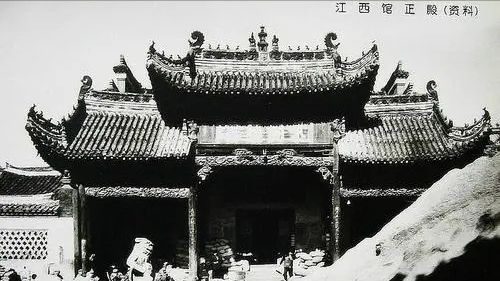
Guild halls, also known as Tongxiang Guild Halls, were first documented in the Qing Dynasty. However, in the early Tang Dynasty, because the King of Luling lived in Fang County, (then known as Fangzhou) here was the Tongheng of Yu, Sichuan, and Shaanxi. During the Ming Hongwu period, a large number of immigrants moved to Fangxian County, which became a gathering place for merchants from Sichuan, Shaanxi, Wuhan and various counties. In particular, during the Qing Dynasty, foreign merchants and mobile craftsmen came to visit a lot, and some settled in Fangxian County, most of them living in towns. In feudal society, these merchants and craftsmen, who lived in foreign lands and were new to the country, were often discriminated against by the locals. Always bow your head and be careful with people, and feel the pain of being isolated and helpless. At the same time, in order to compete, the business community is deceitful and deceitful, and each of them is threatened with bankruptcy at any time. In order to take care of each other, safeguard the interests of their fellow villagers, and ensure and develop their causes, they will use regional friendship to unite themselves and organize hometown associations. Members of each hometown. Voluntary donations were made to raise funds to build the guild hall as a place for liaison and assembly, and the clan hall came into being. Platoons, into the townships, competing for victory and wealth, in the construction of the guild hall, even compared with each other, not willing to be behind. Each guild hall is a palace-style building, with carved beams and paintings, and golden splendor. Located in Xiguan, Jiangxi Guild Hall was built in the 54th year of the Qianlong Dynasty, with an area of 4,000 square meters and more than 20 houses. There are three tall and spacious main halls closely connected to the front and back, and gorgeous side halls on both sides, with theater buildings opposite the main hall and grandstands on both sides. The courtyard is wide, and the vigorous cooper towers over the main hall on both sides, which is spectacular. The building of the house is simple and elegant, and the craftsmanship is exquisite, which is the first of the pavilions. At the door, a pair of stone lions, about two meters high, are very majestic.
Each guild hall has its own worship of the gods. For example, the Wuchang Guild Hall is dedicated to Qu Yuan, the Three Lu Doctors of the Chu State during the Warring States period. The name of Wuchang Guild Hall is also called "Three Academies". In addition to the extraordinary meetings held on weekdays, the Dragon Boat Festival and September 9 are the days of their regular gatherings every year. On this day, in addition to singing and singing to the gods, they also discussed various matters of the township association and announced the income and expenditure of the township association for the whole year.
Each clan hall has a field property as a permanent activity fund for the clan hall. In addition, around the guild hall, there are real estate for people in the township who have settled in FangXian and are poor and unable to buy a house to show their care for the township. For former traders and craftsmen in their hometowns who first arrive in Fangxian County, they will assist them in buying and selling, and provide them with convenient conditions such as food, accommodation, and hoarding places. Generally, when foreign merchants come to the house to do business, they first go to the guild hall to contact, and then start business activities.
The establishment of these guild halls and their activities have enhanced the sense of business security of foreign businessmen, attracted a large number of foreign businessmen to do business in Housing, and communicated the trade exchanges between Fangxian and Jiangxi, Henan, Wuhan, Shanshan, Huangxiao and other places, activated the market economy of Fangxian County, and promoted the development of industry and commerce. After the establishment of the county chamber of commerce in the early republic of China, foreign merchants and craftsmen joined the county chamber of commerce, and their business activities were guaranteed and restricted by the chamber of commerce.
During the War of Resistance Against Japanese Aggression, Wuhan, Xiangfan and other places fell one after another, Fangxian was located in a remote mountainous area, the traffic was inconvenient, and it was less affected by the war. The reception work of the clan halls is quite active. According to the statistics of the Fangxian County Chamber of Commerce in the 32nd year of the Republic of China (1943), the Huangzhou Guild Hall, located on West Street (now the Public Security Bureau), is in charge, Cao Longquan, with five staff members and 127 members. Wuchang Guild Hall, located in Xiguan, (now the head of the Grain Bureau), Cheng Songzhuo, six staff members, 104 members. Shanshan Guild Hall, located in Xiguan, (now the grain management office) in charge of Yi Jifang, five staff, sixty-five members. Henan Guild Hall, located in South Street (now the county party committee office), the person in charge, Tao Chunbao, four staff members, 194 members. Hanyang Guild Hall, located in Xiguan (now Qianjin Agricultural Tool Factory), the person in charge, Wei Xiushan, four staff members, six members. Jiangxi Guild Hall, located in Xiguan (now auto parts factory no. 1), the person in charge, Qu Zizhen, 20 employees, 47 members. The activities of these clans did not stop until the liberation of Fang County.